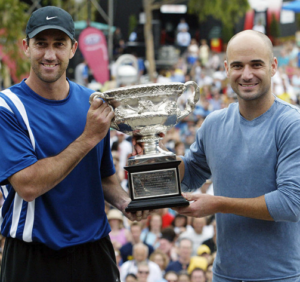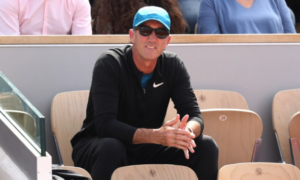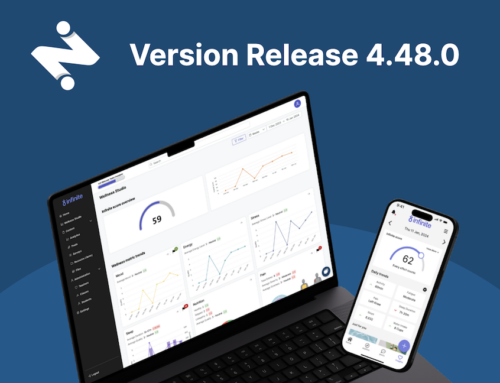Legendary tennis coach and analyst Darren Cahill has been helping us at iNSPIRETEK since 2021, and we recently had the opportunity to talk with him about tennis, mental health, his own struggles during the pandemic, and his thoughts on how to scale better mental health and wellbeing support throughout tennis and sport.
Darren is best known for his work with some of the sport’s greatest players, including Andre Agassi, Lleyton Hewitt, and Simona Halep. He is also a respected analyst and commentator on ESPN. We feel privileged that Darren offers his wisdom and expertise to us as we build our technology and platform to help young athletes and the entire sporting ecosystem to better understand, manage and improve mental health and wellbeing.
Darren has also been very open about his own mental health struggles recently, and his answers below are impactful and important for every young tennis player and young athlete, as well as those that support them, especially coaches and parents.

Darren back in the day with Andre Agassi.
Can you offer some thoughts on the mental health epidemic and related issues among young people in sport?
Darren: “While there’s always been shifts and outside influences in the way every generation has been raised, the current generation of teenagers and young adults are going through a monumental change in habits and a way of life. To see a teenager sitting at a table without a mobile phone in hand and busy on a social media site, or messaging platform is a rarity these days.
All of these forms of communication lead to instant feedback and the vast majority of it can be brutal and damaging. Opening yourself up to the outside world of people that you have no personal connection with, and then relying on feedback as a way to build personal esteem or confidence can lead to many harmful situations.
In the sporting world, most athletes are encouraged to build social media platforms with huge followings. It allows sponsors to leverage off the back of those following and creates more income potential for the athlete. It also leads to abuse, and taken the wrong way, can be damaging to an athlete’s mental health.
Today’s young athlete is vastly different from athletes of past generations. They can’t be spoken to in the same way as an older athlete, and coaching has had to be refined and adjusted to move with the shift. There’s a sensitivity and judgment with every harsh word by any coach or teacher, whereas previous generations were seasoned to cop an honest “spray” or “bake” for a lack of performance as a way to get the best out of that athlete, to inspire and motivate them to improve. You need to think very carefully and know your athlete very well if you’re thinking of going down that path with the young generation. The new style of coaching is to show empathy, ask questions, challenge your athlete to come up with answers and provide a safe, stable environment where they can prosper. “
How have you seen the stigma around mental health change during your career as a player and coach?
Darren: “Tennis players have been much more open to discussing mental health issues in the last five years than ever before. Whereas in the past it was seen as a weakness to express that you have issues, now players know that they are not alone with mental health problems, and they are looking for better ways to deal with them.
Those issues can arise from a variety of places and depending on how deep they go, they can have a devastating effect on performance. At the professional level, this can include:

Darren and his former player, women’s tennis star Simona Halep.
- dealing with nerves
- performance anxieties
- parent pressure
- coach pressure
- social media feedback
- expectations from those closest to you
- sponsor obligations and expectations
- financial pressure
- wanting success too much
- lack of enjoyment or love of what you do
The coaching role now is more complicated as it doesn’t just stay with the time that you put in with the athlete on the sporting field. There’s real care that needs to be shown, and time spent outside of the arena getting to know the athlete helps in dealing with many situations that arise.
The type of question you ask a player when you know there’s a mental health issue of some sort is vitally important. The most important thing to do is show that you care. You care about the athlete as a person and that you’re there to help in any way possible.”
You recently went public with your own mental health struggles. Did that give you a new perspective on this issue that you didn’t have before? Has it changed anything about how you approach working with young athletes?
Darren: “The most surprising thing that came from my experience with depression was that I had no idea that I had it while I was struggling. I knew things were not great and I felt off. Something was not quite right but I believed it was related to a deficiency or illness somewhere in my body. I had multiple checks from doctors and blood work examined which showed nothing other than a couple of low markers but otherwise a very healthy 55-year-old male. From a mental health point of view, what did I have to complain about? I have a beautiful family and work in a sport that I love. I get to travel the world working with high-performance athletes and also work for one of the most powerful sporting networks in the world as a tennis analyst at Grand Slams for ESPN. My life was and is very good and I’m fortunate. Yes, there is pressure involved with my roles but I wouldn’t have it any other way.
It’s the athlete and competitor inside that will forever burn that continues to drive us to improve and ultimately search for success. As they say, coaching is the next best thing to competing, when in fact it’s actually better and more emotionally rewarding in many ways. In short, I had nothing to complain about and basically thought that I just needed to boot myself up the backside to get going again after a difficult year, and a long stint in quarantine that left me flat.
For Australians involved in the tennis tour, we were definitely lucky that we were able to continue to work and earn an income but it came with its difficulties. Once you departed Australia, re-entry back into your home country became extremely difficult with the tough border restrictions in place. When we left the country at the end of the 2021 Australian Open in February, most of us knew that we wouldn’t be returning to Australia until late September, at the earliest.
 My year was difficult professionally so it made the time away from family that much harder. After the US Open in September and a couple of canceled flights by the airline, I made my way back to Sydney where I completed a 14-day quarantine period in a hotel room. There was a new restriction in place by the South Australian government that earmarked Sydney as a “hot spot” resulting in another 14-day quarantine period when entering South Australia. So, 28 days sitting alone in a hotel room contemplating where things went wrong in 2021, what I could’ve done better, how can I improve as a coach, and basically beating myself up about a difficult season that should’ve been better, and taking responsibility for it.
My year was difficult professionally so it made the time away from family that much harder. After the US Open in September and a couple of canceled flights by the airline, I made my way back to Sydney where I completed a 14-day quarantine period in a hotel room. There was a new restriction in place by the South Australian government that earmarked Sydney as a “hot spot” resulting in another 14-day quarantine period when entering South Australia. So, 28 days sitting alone in a hotel room contemplating where things went wrong in 2021, what I could’ve done better, how can I improve as a coach, and basically beating myself up about a difficult season that should’ve been better, and taking responsibility for it.
I emerged in late October from those 28 days in quarantine excited to see my family but knew something was wrong. A lack of energy, a loss of appetite, my mind racing at lightning speeds when my head hit the pillow, and a little anxiety over what was next for me in the tennis world. I knew it was a long exhausting year and just believed I was tired and needed to refresh. But even three months later at the 2022 Australian Open, there was little or no excitement about coaching or being at tennis. I had dropped close to 13 kg in weight, still felt exhausted, and couldn’t keep going, my tolerance was low for any problem that arose which was all confusing to me as patience and calmness are normally my stronger traits. I met with some doctors, and it became clear to them that I was struggling with depression and anxiety.
The doctors were wonderful. They educated me about how depression works within the brain, and how it is treated. I went on medication to help me through the process and within a few months it felt like the clouds had cleared in my head, energy returned, eating habits became normal and things had become a lot clearer about what was needed to get going for the future. The excitement about getting re-involved within the coaching world of tennis had returned and two months later I was back on tour and loving every second of it.
Maybe the biggest lesson I learned was that it can happen to anyone even if you believe you are in a good place in life. Ask for help if things don’t feel right and be honest with your communication. Don’t be afraid to express that you are struggling to those closest to you.”
What role can technology play, when built and designed properly, to help scale support to people that may be unable or unwilling to seek out the help they need?
Darren: “This I really struggled with as I figured that I needed to work through my issues by myself. To not burden anyone with my problems. This is where technology and a properly built platform regarding mental health can be of enormous value. To help people like myself that are a bit confused, maybe embarrassed, or even stubborn about mental health, and how it should be treated. It should be treated just like a skill that any athlete needs and worked on constantly because it affects performance enormously. A place to go and ask questions, to seek advice, to listen to others that have been through similar circumstances, and understand how they have worked their way into better places.”

Darren cheering on his current player, Jannik Sinner.
Do you think athletes in tennis and individual sports have to deal with mental health and well-being issues in a different way than team athletes?
Darren: “Tennis is a little unique in that it is a one-on-one sport. We are alone on the court and the internal dialogue that we have with ourselves is not always pleasant. Learning techniques and building the framework to remain positive and see the good in what we accomplish play a massive part in being successful. The difference between what we do in life, in our work, or on the sporting field is very little and it all plays a big part in being the best possible version of ourselves every day.”





